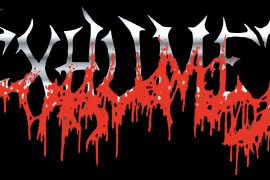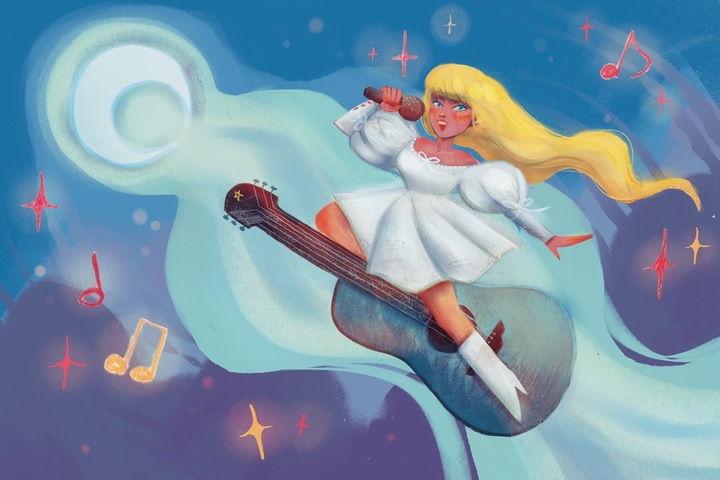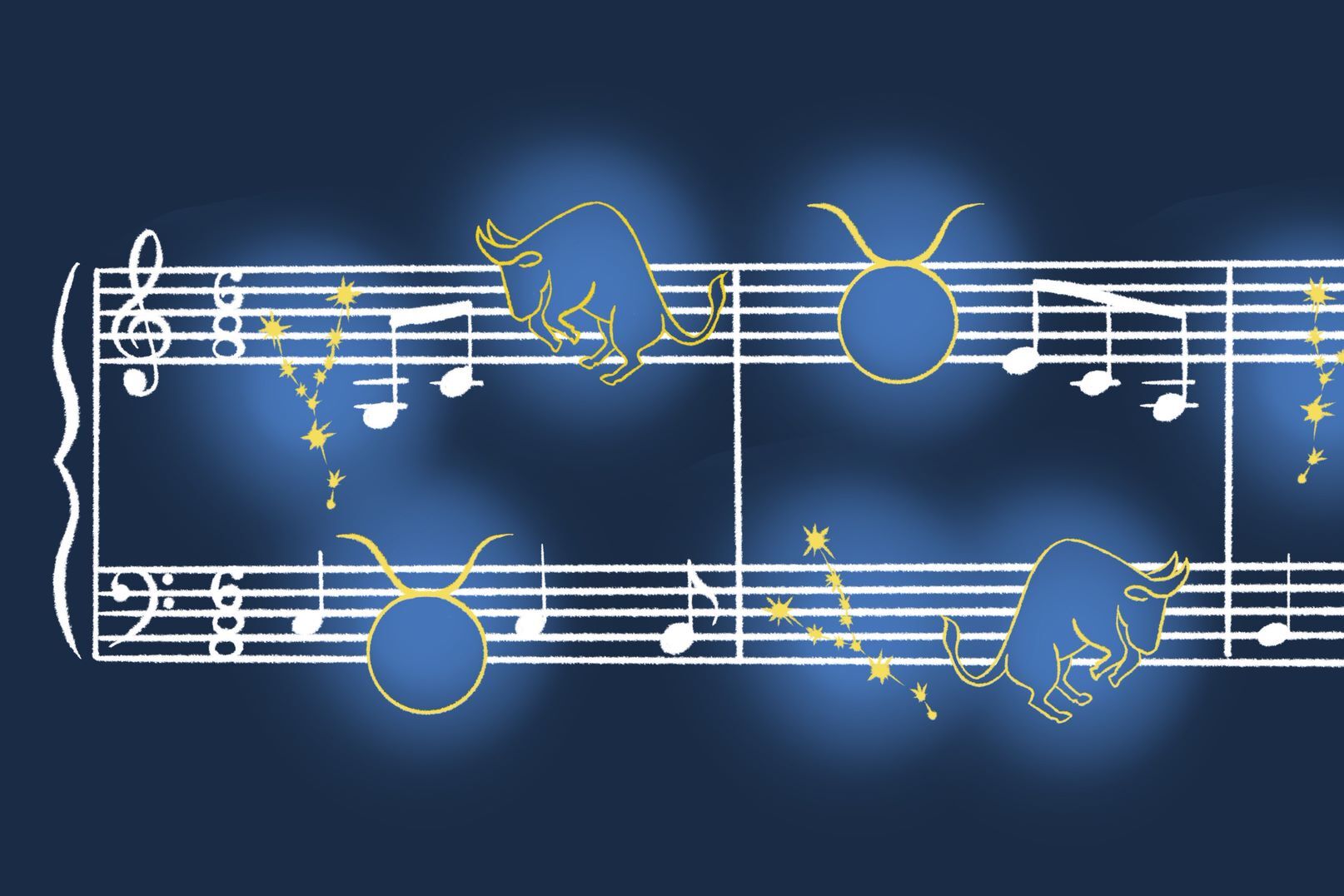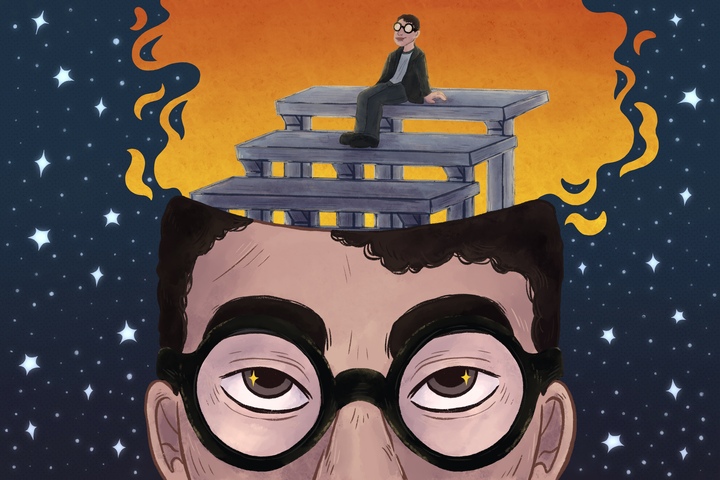SCAD Radio was recently lucky enough to get the chance to ask Matt Harvey from Exhumed some questions ahead of the release of their latest album.
Exhumed is an American death metal band that is credited as being the father of the goregrind metal genre. Having been making music since 1990, the band looks to release their first concept album, Death Revenge.
K: Hey! It’s Kush with SCAD Radio in Savannah, GA.
M: Hey Kush, thanks for the interview! Savannah is an awesome town, haven’t been there in a long time, but was always a cool place to play, rock, and party!
K: What’s it like to be considered a pioneer in the genre, and to have newer bands cite you as a major influence?
M: Uh… I dunno? I mean I guess it’s flattering to be referred to like that, but it’s not something I really give a lot of thought to. I try to focus more on what we’re doing and finding my own voice and doing my own thing rather than what others might think of what we do, good or bad. I’ve always thought that it can be dangerous to listen to too much praise, haha! If bands consider us an influence, that’s very humbling. I’m always floored hearing people’s stories about how Exhumed was a part of their journey to underground music. I really treasure my own journey and I know how much records like Pleasure to Kill, Scream Bloody Gore, and Horrified mean to me, so to be a part of someone else’s experience of discovering underground metal is something that really resonates with me.
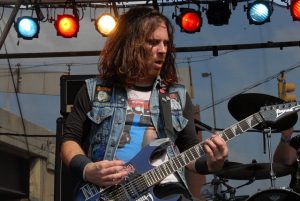
K: Are there any new bands in the gore-grind genre that you find to be very exciting right now?
M: Hmmm…. I don’t listen to too much of the newer stuff anymore, (I know – lame, right?) but I really dig what VHS is doing. They are really fun and energetic and capture a lot of the same kind of feel that we had when we started – in their own way, of course. I loved the Drown in Blood record by Ruin that came out this year. Probably the heaviest record I’ve heard in quite some time.
K: How does your new album, Death Revenge show the growth and maturation of Exhumed?
M: It was the most involved record to make, that’s for sure. But at the same time, we tried not to overthink the songs themselves. There are a couple of riffs on there that I wrote in high school, for example. In some ways, I think it hearkens back to what we wanted to do when we first started the band back when I was a pimply-faced teen, but in others it’s a lot more sophisticated. This album was a real project to put together, with a cover artist, an interior artist, a producer/engineer for the record, and a separate producer/arranger for the film-score elements that we used on the record as well. So there were a lot of moving parts that had to come together. We really had to craft all the puzzle pieces correctly independently of each other so that they could be assembled at the end and form a complete picture. So that was a far more sophisticated process than the records we’ve done before.
K: Your last album, Necromancy, used gore lyrics as an allegory for American politics and culture. Do you aim to continue this with your latest album?
M: This album is completely different. I wrote the lyrics for Necrocracy during the Obama/Romney election and was trying to bring up some of the corrosive results of collective fictions like “money = speech,” and “corporations = people,” as well as the predatory nature of the American financial system and the dangers posed by the security state. I couldn’t have imagined how much worse and more dangerous all of those things could become under President Trump, who was a disgusting fraud of a businessman and “reality” tv star and has revealed himself to be by far the most loathsome Commander-in-Chief of my lifetime. I had decided well before last year’s election that I wanted to return to something horror-related. Honestly between the election and Brexit last year, I’m so disheartened by the political state of the western world that I wouldn’t want to make a record about it, simply because I’d have to spend more time thinking about it.
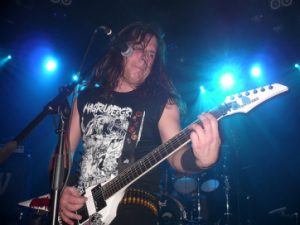
K: What led to the decision to create Death Revenge as a concept album?
M: I had considered doing a concept album before, but I thought it might be a bit too pretentious for us to do. Once I stumbled upon the story of the Burke and Hare murders in Edinburgh in the late 1820s, the story just seemed to fit our aesthetic so perfectly, I felt that if we were ever going to do a concept album, this would be the thing to do it about. I write comics, so I tend to think of things in narrative or story-based terms anyway, so it was a nice way to kind of dovetail both my love for death metal and storytelling into one project.
K: Did making Death Revenge a concept album affect the way you wrote when compared with your previous works?
M: It didn’t affect the riff-writing and the arrangement of the individual songs too much, but it required very intentional song sequencing, as well as making the lyrics and music work together very specifically. Those were some different considerations than we usually have to take into account when we put an album together. Before the concept came into the picture and I was just working on the music I just had the basic idea that I wanted to do something darker than the last record, and everything else kind of flowed more or less naturally from there. It was only when the lyrics and sequencing got started that things became markedly different than what we’ve done in the past. I had the thought to do an instrumental before I really started writing anything as well, and it seemed to fit nicely with the overall vibe of the whole project.
K: What was it like working with Jarrett Pritchard as producer on the album?
M: It was, in a word, great. We had recorded All Guts, No Glory and Necrocracy in the same studios, and while we were really happy with how those came out, we wanted to mix things up this time and get a totally different vibe, not just as far as the sound of the album, but the location and the experience for us as well. So we went from the desert of Southern California and Arizona to the swamp of Florida this time. We knew Jarrett pretty well, he had tour managed and done sound for Suffocation when we toured with them, and I had worked with him with my other band, Gruesome, so I knew he’d do a great job. I was mentally preparing myself for more of a “drill-sergeant” kind of experience, but I must have been more prepared than I thought I was, because it was pretty smooth. Definitely a lot of hard work, but things kept moving pretty much the whole time.
K: You guys have been in the scene for a super long time now. What are some of biggest changes you’ve seen in metal over that time?
M: I think the changes in metal are a lot like the changes in music in general since the late 80s when I became a fan. With the advent of the internet (does anyone ever not mention the internet in this kind of question?) obviously the business dynamics have shifted, but that doesn’t affect underground bands as much, as they weren’t ever selling truckloads of albums, so really the playing field has evened a bit between indies and majors. But the biggest thing is that with the internet and streaming and illegal downloading, nothing is ever really out-of-print. In the brick-and-mortar era, once an album was out of print on a small label, your chances of finding it available for purchase or even just to listen to were pretty small. If you weren’t in the tape-trading scene, forget it. Now, you can easily dig up classic bands’ rehearsals, long deleted catalog from obscure labels, or whatever you might want to hear. That is an amazing thing that not only empowers fans by granting them as much access as their musical curiosity demands, but empowers underground bands because there are platforms that will keep their music in circulation for the foreseeable future. I think it’s really helped some of the more obscure bands I’ve personally been championing since before the internet went mainstream like Demilich, Razor, Morbid Saint, and many, many others, which I think is a wonderful thing.
K: What’s coming up for Exhumed in the near future?
M: We have a week of shows with The Black Dahlia Murder and Suffocation, and then we will be announcing some headlining dates for November and December across the US very soon. In the more immediate future, another beer.
Stay tuned to SCADRadio.org for the latest music news.
